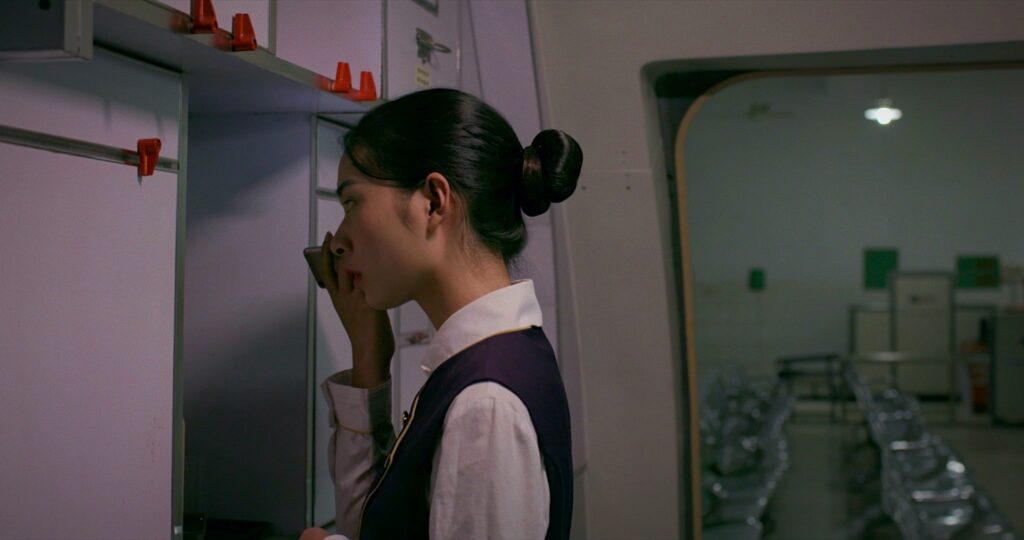Huang Ji is an award-winning independent filmmaker based in Beijing. Born in Hunan in 1984, she studied screenwriting in the Beijing Film Academy. Since her first short film, “The Warmth of Orange Peel” (“橘子皮的溫度”) (2009), Huang has been exploring the secrets of women’s inner emotions. 2012’s”Egg And Stone” (“雞蛋和石頭”), her debut feature, won the Tiger Award of the International Film Festival Rotterdam, while her sophomore film, 2017’s “The Foolish Bird” (“笨鳥”), was awarded the Special Mention of the Generation 14+ International Jury at Berlinale. Huang is also the founder and tutor of Around You Film Workshop, which engages in educating the new generation.
“Stonewalling” (“石門”) is screening at the 2022 New York Film Festival, which is taking place September 30 – October 16. The film is co-directed by Ryuji Otsuka.
W&H: Describe the film for us in your own words.
HJ: How do we maintain a positive outlook throughout the ten months of a pregnancy? “Stonewalling” follows Lynn, a college student who needs to overcome the incongruence between the rapid pace of modern life and her own slower internal metronome.
W&H: What drew you to this story?
HJ: When our daughter was five years old, she asked us, “Why did you have me?”
I didn’t know how to answer, but I thought about my own childhood. My mother is a gynecologist and she would bring me along for deliveries and abortions. When the Chinese government went from enforcing the one-child policy to lifting all restrictions on birth, women could freely choose whether to keep or abort their pregnancies. But abortion rates did not decline.
Why do women decide to have kids? Could they feel even less grounded than before pregnancy? I wrote a story of a young woman’s pregnancy and used ten months to tell it, exploring this confusion over those months. We thought of our daughter’s future as we shot it.
W&H: What do you want people to think about after they watch the film?
HJ: We shot over ten months because we wanted to explore the physical and psychological impact the amount of time a full-term pregnancy would have on Lynn. Aside from all moral and legal implications, pregnancy and birth is ultimately completed singularly by the woman alone. I hope audiences can think about how complicated the road to new life is, and how it’s important to increase awareness and access to contraception so that we don’t make decisions about whether to become parents after we get pregnant.
W&H: What was the biggest challenge in making the film?
HJ: We had a three-person crew shooting over ten months.
W&H: How did you get your film funded? Share some insights into how you got the film made.
HJ: We received the The Hubert Bals Fund in 2017 for script development, which gave us time to complete the script. After that, the project was selected for the Hong Kong Asian Film Financing Forum (HAF) where we received a lot of attention. The shooting was completely self-financed. After wrapping up the shoot, we received the HAF Work-in-progress Fiction Award in 2021, which we used to complete the film.
W&H: What inspired you to become a filmmaker?
HJ: At first it was because of my experience of sexual assault as a child. It was a very painful experience that led me to make my first feature film, “Egg And Stone.” Looking at the different stages of my life, I feel that I was not smart; that my reaction was not fast enough. And a lot of my life lessons have been corporeal lessons. I have discovered that many women in my life are similar to me, but because they are unassuming, their lives are neither written about in books nor the focus of films. Though they are slower to learn and make decisions, they’re patient, tenacious, and discover their place in society in their own way. I wanted to express the power of women from this perspective.
W&H: What’s the best and worst advice you’ve received?
HJ: Sometimes the best and worst advice is the same. In 2003, my first year of university, I wrote a script. The majority of the scenes were shot underwater. My teacher said the budget was too high and discouraged me from shooting it. At that time, underwater cameras were very rare, and I decided to buy a digital camera to shoot documentaries. And that is how I completed my very first film the following year.
W&H: What advice do you have for other women directors?
HJ: Introduce yourself through your visions and do not wait for others to give you an opportunity. One person, two people, three people can make a movie.
W&H: What, if any, responsibilities do you think storytellers have to confront the tumult in the world, from the pandemic to the loss of abortion rights and systemic violence?
HJ: Do not turn away; face the reality. Go to the scene and be there with the people affected, see how they feel and document their experience, their feelings. But don’t be poetic and glorify trauma, otherwise the audience will release their own anxieties with the film and forget these social issues.
W&H: The film industry has a long history of underrepresenting people of color onscreen and behind the scenes and reinforcing — and creating — negative stereotypes. What actions do you think need to be taken to make Hollywood and/or the doc world more inclusive?
HJ: Don’t manipulate the stories of ordinary people into heroes: This reduces the different struggles of various group and nations into a simplified “how to defeat villains to give ourselves power” narrative.
Huang responded to W&H’s questions in Mandarin. Her answers were translated by Pearl Chan.







